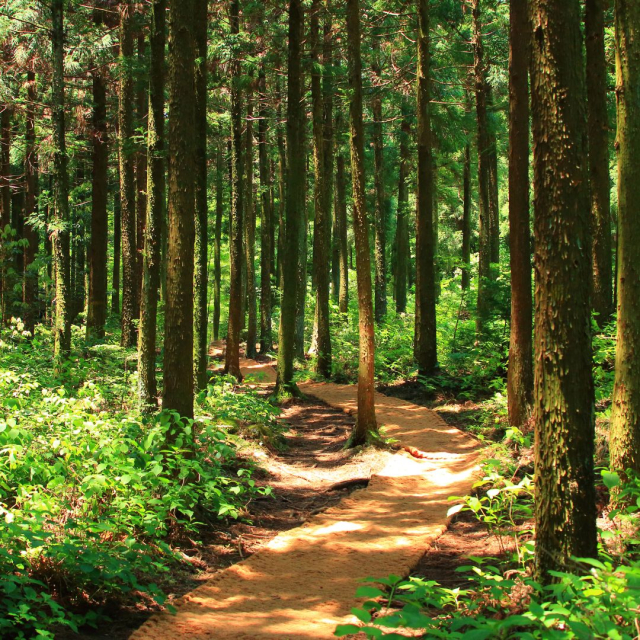Since 2012, March 21 is celebrated as the International Day of Forests, a date proclaimed by the United Nations General Assembly to raise awareness of the importance of all types of forests in the world. This global commemoration seeks to highlight the fundamental role that forests play in the lives of people, ecosystems and the planet's climate.
The importance of forests
Forests cover approximately 31% of the Earth's surface and are home to more than 80% of the planet's animal, plant and fungal species. They also provide multiple ecological, economic and social benefits:
Climate regulation: Forests act as carbon sinks, absorbing millions of tons of carbon dioxide (CO2) each year and helping to mitigate climate change.
Biodiversity: They are vital habitats for countless species, many of which are endemic and found nowhere else in the world.
Natural resources: They provide wood, food, medicines and other products that sustain local and global economies.
Ecosystem services: They help maintain the water cycle, prevent soil erosion and improve air quality.
Human well-being: Forests also have cultural and spiritual value, offering spaces for recreation, meditation and learning.
The current situation of forests
Despite their importance, forests are under threat. Deforestation and forest degradation continue at an alarming rate due to human activities such as intensive agriculture, livestock farming, mining and urbanization. According to the Food and Agriculture Organization of the United Nations (FAO), more than 420 million hectares of forests were lost between 1990 and 2020.
Main causes of deforestation
Extensive agriculture: The conversion of forests into agricultural land, especially for crops such as soybeans, palm oil and coffee.
Livestock farming: The expansion of grasslands for meat and dairy production is one of the biggest causes of tropical forest loss.
Illegal logging: Unregulated logging contributes significantly to forest destruction.
Urbanization: City growth and infrastructure construction encroach on forested areas.
Forest fires: Often caused by human activities, fires represent a recurring threat to forest ecosystems.
The impact of climate change
Climate change and forest loss are intrinsically linked. On the one hand, deforestation contributes to the increase of greenhouse gases in the atmosphere. On the other, climate change exacerbates phenomena such as droughts, heat waves and forest fires, which negatively affect forests.
A clear example of this impact is found in the Amazon, known as the "lungs of the planet." This vast tropical forest has lost large areas due to deforestation and fires, putting its capacity to absorb carbon and maintain biodiversity at risk.
Objectives of the International Day of Forests
The International Day of Forests not only celebrates the importance of forests, but also seeks to generate action. Some of its main objectives include:
Awareness raising: Informing people about the benefits of forests and the threats they face.
Promoting reforestation: Encouraging the planting of trees and the restoration of degraded areas.
Education: Promote knowledge about sustainable practices in forest management.
Collaboration: Bringing together governments, organizations and communities to work together to protect forests.
Climate action: Highlight the role of forests in combating climate change and promote policies that reduce deforestation.
Each year, the International Day of Forests has a specific theme that focuses activities and campaigns. For example, themes such as "Forests and energy" or "Forests and biodiversity" have been selected to highlight different aspects of their importance.
Actions to protect forests
Although the challenges are significant, there are many ways that individuals, communities and governments can contribute to forest conservation and restoration:
At an individual level
Responsible consumption: Choose products with sustainable certification, such as FSC-certified wood or food produced without deforestation.
Reduce waste: Avoid paper waste and opt for digital alternatives whenever possible.
Participation in reforestation: Join local initiatives to plant trees and restore degraded areas.
Education and awareness raising: Sharing information on the importance of forests and the threats they face.
At community level
Conservation projects: Collaborate in programs for the protection and sustainable management of local forests.
Promoting clean energy: Reducing dependence on wood-based fuels by using renewable energy.
Strengthening indigenous communities: Supporting indigenous communities in defending their territories and traditional knowledge.
At the government level
Legislation and policies: Implement stricter laws to prevent illegal logging and promote sustainable forest management.
Reforestation investments: Allocate funds to programs that restore degraded areas and protect existing forests.
International agreements: Comply with climate and biodiversity commitments established in conventions such as the Paris Agreement.
Despite the difficulties, there are many inspiring stories of forest conservation around the world. One example is the “Great Green Wall” in Africa, a project that seeks to stop desertification in the Sahel by planting millions of trees. Another notable case is Costa Rica, which has managed to reverse deforestation and restore much of its forests thanks to innovative policies and payments for environmental services.
The International Day of Forests is an opportunity to reflect on our relationship with nature and recognise that forests are essential for the survival of the planet. Protecting them is not only an environmental issue, but also a matter of social, economic and climate justice. We can all be part of the change: from daily decisions in our consumption to collective actions to restore and conserve these precious ecosystems.
On this March 21, let us celebrate forests and commit to caring for them, so that future generations can also enjoy their countless benefits. Because at the end of the day, protecting forests is protecting life itself.
